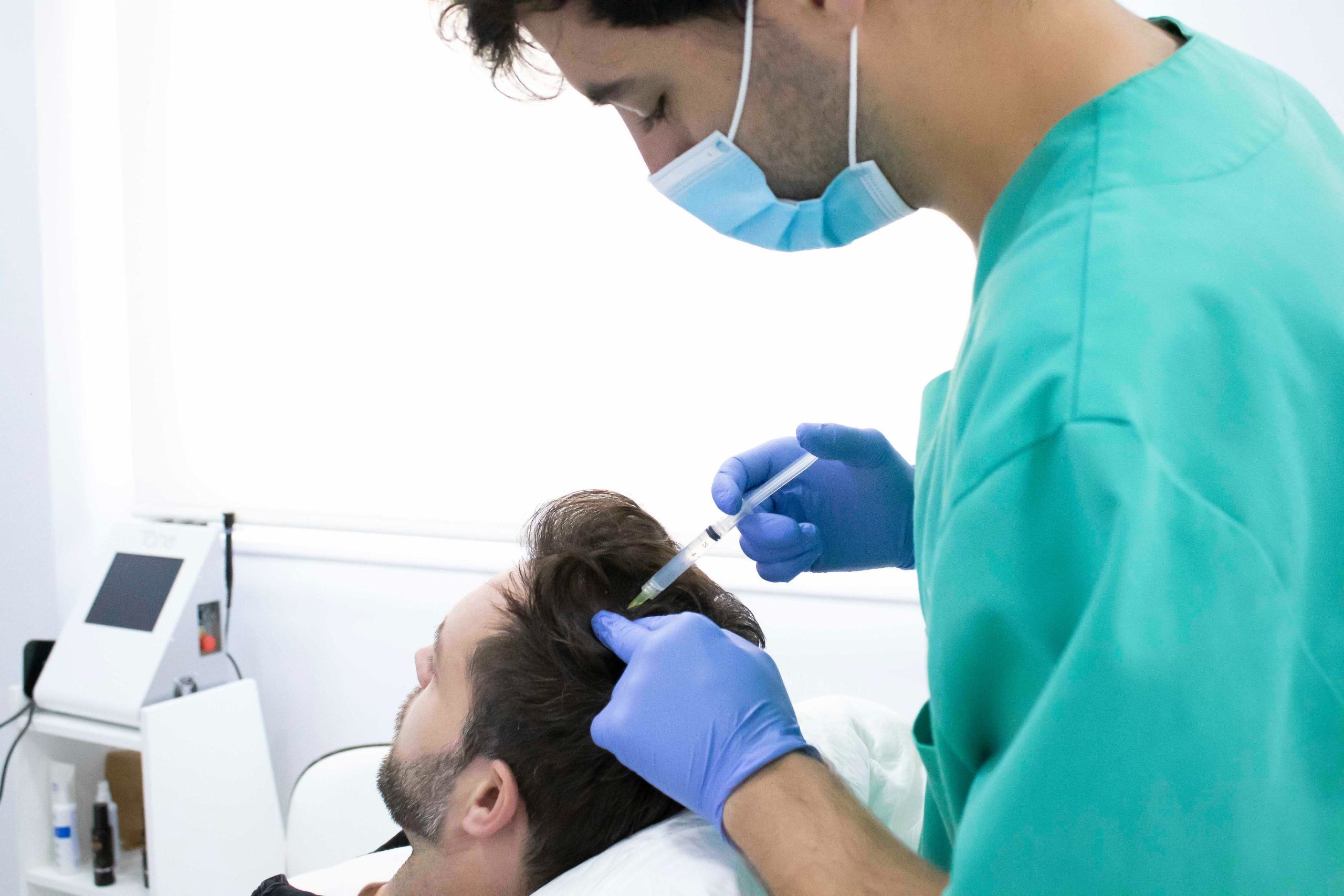
A hormonal alteration is one of the most frequent causes for which our hair falls out. It even triggers alopecia, making it so that the hair that falls out does not come back. Knowing the relationship between hormones and hair loss can be useful to know the main reasons why we lose our hair and, above all, to know when it is necessary to see a specialist in case of hair loss.
From Hospital Capilar We will tell you how hormones intervene in hair growth, often being the cause of hair loss. Hormones and hair loss are related and since Hospital Capilar We tell you how they influence our hair health.
We have a wide variety of hormones in our body and, depending on the type in question, they are responsible for executing and regulating certain physiological processes such as responses to nervous stimuli or sexual desire, among many others.
Hormones are involved in the proper functioning of multiple organs in the body. In this sense, the hair itself is "housed" or born from organs called Hair follicles. From these hair follicles, in the form of a small bag inserted in the scalp, the hairs are born and grow, and a single hair follicle can contain up to 5 hairs. They have their own life cycle and are sensitive to hormonal changes in the body. According to medical team of Hospital Capilar, the relationship between hormones and hair loss focuses on the fact that they are capable of altering the rhythm of life of the hair follicles, even causing their shedding.
Mainly there are 3 hormones that influence the life cycle of the hair. Depending on the alteration that occurs, it causes a type of alopecia or different fall.
Androgens are male sex hormones responsible for male sexual characteristics. These are also present in women although, under normal conditions, in low quantity. Testosterone is the androgen that intervenes in the life cycle of the hair when it becomes what is known as dihydrotestosterone. This occurs when the 5 alpha reductase enzyme synthesizes testosterone converting it into this androgen which, when it affects the hair follicles, causes a androgenetic alopecia.
Androgenetic alopecia is the most common of all, especially among men, although women also suffer from it. It occurs when the Dihydrotestosterone mentioned above attacks the hair follicles causing the hair miniaturization and subsequent fall. The hair that falls out because of this will not come back.
When explaining the relationship between hormones and hair loss, it is essential to comment on the role of estrogens. They are female sex hormones that are produced by the ovaries in women. They are responsible for breast growth, menstruation and feminine characteristics, among others. Regarding the relationship of estrogens with hair, the truth is that when there is a mismatch as estrogen levels drop in the body, hair loss occurs, normally telogen effluvium.
Telogen effluvium is an unusual hair loss in which most of the follicles enter your telogen phase or fall due to a hormonal imbalance, among others. It can happen after the pregnancy, moment by which a hormonal alteration occurs after giving birth that accompanies hair loss in the form of telogen effluvium. It also occurs in many women during menstruation, with the arrival of the menopause or even when we experience episodes of high levels of Stress. In these cases cortisol increases, which causes hair loss. Normally this hair loss is reversible and the hair that falls out comes back. In these cases, treatments such as Platelet Rich Plasma, although the hair will stop falling once the episode that causes it is over.

On the other hand, thyroid hormones can also influence the normal functioning of hair follicles. In cases of hyperthyroidism where there is a lack of production of TH3 and TH4 hormones, the hair will become more brittle and fall out.
After knowing the relationship between hormones and hair loss, it is important to know how to detect its symptoms. In this way, we will know when it is necessary to go to a hair clinic and when it is not necessary.
In the cases in which we notice an increase in the number of hairs that fall but it is not accompanied by a considerable loss of density, in principle there is nothing to worry about since it is a sign that the hair that falls out is coming out again. On the contrary, if a loss of density is experienced, it is possible that we have an acute telogen effluvium or, even, the beginning of a alopecia.
In cases where there is already a lack of hair in the entrances and the crown of the head is lightening, it is a symptom of androgenetic alopecia. The hair that falls out does not come back and this requires medical treatment.. For this reason, it is key to go to a specialized hair clinic soon before the visual impact is greater.
In the case of women, it is common to experience that the hairline widens. This is a symptom, once again, of hormonal alopecia and requires medical treatment. The hair that falls will not grow back, so it is advisable to request a medical diagnosis as soon as possible.
There are different treatments to treat hormonal alopecia such as androgenic alopecia. For it, a medical evaluation is necessary where the medical team assesses each particular case and, consequently, can recommend the most effective treatment.
There are drugs with antiandrogenic action such as Finasteride aimed at treating androgenic alopecia. They are capable of inhibiting the action of Dihydrotestosterone, which is why they stop hair loss caused by this hormonal alteration.
La hair mesotherapy and Platelet Rich Plasma are two highly beneficial hair treatments to stop hormonal hair loss. Depending on the medical diagnosis, both can be recommended.
As we have previously mentioned, hair that falls out due to alopecia does not grow back. The only way to see ourselves with hair again in these cases is through a FUE hair transplant.

En Hospital Capilar We have clinic in Madrid, riding a Murcia y Pontevedra where you will be attended by professionals from the hair sector. Request your medical diagnosis at no cost and put yourself in the hands of an expert medical team.
Sanitary Reg. No. Pontevedra: C-36-003121 Sanitary Reg. No. Madrid: C517593 Sanitary Reg. No. Murcia: 40004094


Copyright © 2021 - Legal Notice and Privacy Policy - Cookies policy